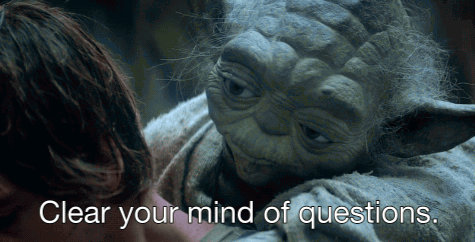Long, long ago, in a galaxy far, far away, a young man named Luke Skywalker asked his dying mentor a question.
“Is Darth Vader my father?” Luke asked as Yoda lay on his deathbed.
“Or is he maybe not my father and it’s only just a rumor? Or do you think I misunderstood what he said because of that big mask he wears? Or was he just trying to get in my head when he said that to me the other day? Or do you think…”
If you don’t know Star Wars, you may not know this, but that’s not what Luke said. He just asked “Is Darth Vader my father?” It’s a great scene, in an iconic movie.
But imagine how bad the scene would have been if he’d rambled all those potential answers to his question? It would have ruined the moment. Yoda would have died before he could answer.
This mistake that Luke (thankfully) didn’t make illustrates something I see all the time today, and once you start noticing it, too, you won’t be able to stop.
Say all you want about touchscreens and AI, but if I were to propose a defining characteristic of today’s media era it would be interviews. Talk show interview clips dominate Instagram and Reddit. Most long-tail podcasts are interview shows (and a quarter of the top 100 podcasts, according to Pew Research).
We live in the Q&A Era.
If you pay attention to highly successful interviewers, you’ll notice that they tend to do two things quite well. They make their guests comfortable, and they ask excellent questions.
Making guests comfortable is about charm and/or conversation that builds rapport.
Asking questions is about extracting information you couldn’t otherwise get—or guess.
As a former journalist who now studies human behavior, I pay particular attention to how people ask questions. And I’ve observed a simple but powerful pattern that separates the most successful interviewers from amateurs.
I’ll illustrate it through a sample exchange:
Interviewer 1: How did you start this business? Did you raise money from investors? Did you go to friends and family? Or did you just power through the early days through sweat equity?
Interviewer 2: How did you start this business?
Which interviewer would you guess is an amateur podcaster, versus a seasoned TV anchor?
Which interviewer extracts the more interesting, more surprising insights from their subject?
The professional is Interviewer 2.
Listen to Terri Gross, Michael Barbaro, or Anderson Cooper, and you’ll hear them ask short, clear questions like “Why?” or “Can you tell me more about that?”
Listen to any moderately- to un-successful podcaster interview, and you’ll tend to hear multiple choice questions.
This isn’t a knock on podcasters, so much as it’s a knock on human nature. People tend to have a hard time ending questions at the question mark—especially when those questions put people on the spot. We try to soft-land the plane. Or we feel uncomfortable that the question was too short. And so we suggest a list of responses.
The more nervous Luke Skywalker is, the more rambly and option-filled his questions become.
From a psychology standpoint, this has to do with humans’ tendency toward an acquiescence bias; in order to get along with others, we tend to ask questions that reduce the risk of putting friction on our relationship. Offering multiple choices for how to answer a question reduces the mental effort we put onto the person we’re asking the question to, and that makes us (the interviewer) more comfortable in the social situation with that person.
But if our superordinate goal in asking questions is to keep people comfortable (or to keep ourselves comfortable), we’re going to compromise on information gathering. Asking open-ended questions opens up the opportunity to learn information we couldn’t already have guessed. Eliminating the easy off-ramp of suggested answers may reduce comfort, but it increases possibility.
In this Q&A Era of mass media, even those of us who don’t host interview shows are asking more questions than ever. The rise of AI tools has shifted our habits from keyword searching toward chatbot questioning. Workers are asking AI questions all day long.
And leaders who deal with real humans in the real world are in the business of asking questions. We question prospective employees. We question suppliers. We question sales prospects. We question our team members.
If your goal is to pin someone down, by all means ask them a “yes or no.” But if your goal is to increase your knowledge, resist the temptation to offer answers. Just ask the question.
The simple habit of cutting your questions off at the question mark will open the aperture of what you learn.
Thank you so much for reading!
—Shane
An award-winning business journalist and Tony-winning producer, Shane Snow is the bestselling author of Dream Teams and a renowned speaker on leadership, innovative thinking, and storytelling.






Tbh, I still struggle with this when interviewing people. How do you get yourself to stfu after the first question?
GREAT point.